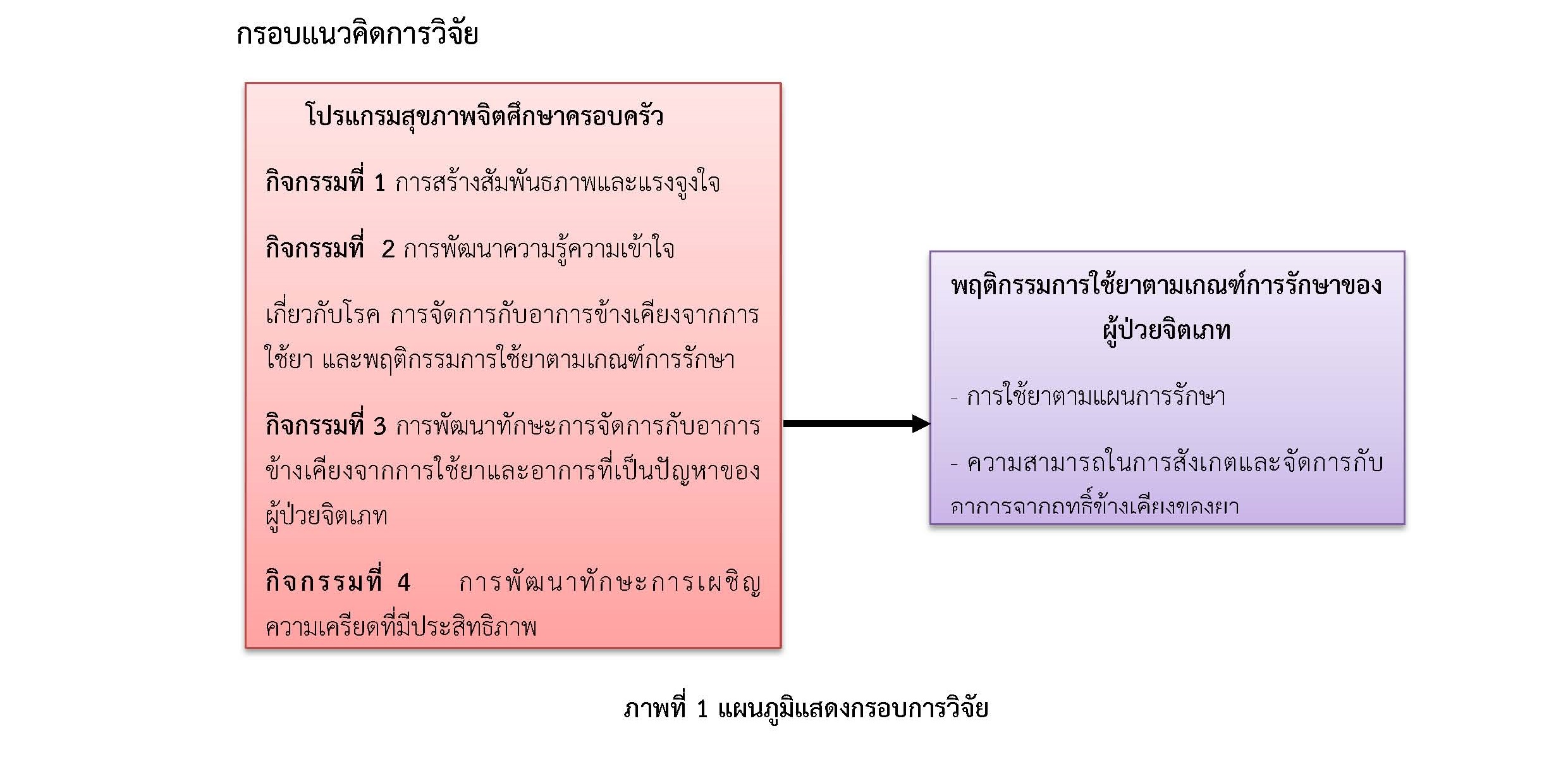The Effect of applying a Family Psycho-Education Program on Medication Adherence Behaviors among Schizophrenia Patients in a Community, Somdejprapiyamaharachrommaneeyaket Hospital, Kanchanaburi Province
Keywords:
Schizophrenia patients, A Family Psycho-Education Program, Medication Adherence BehaviorsAbstract
The objective of this quasi-experimental study was to compare medication adherence behaviors among patients with schizophrenia in a community, before and after applying the family psycho-education program. Thirty participants were recruited by purposive sampling. Participants were diagnosed with schizophrenia and were being treated in the psychiatric clinic, the outpatient department, Somdejprapiyamaharachrommaneeyaket Hospital, Kanchanaburi Province between September 17 and October 22, 2021. The research instruments were a family psycho-education program that proposed by the concept of Anderson et al. (1980) and the medication adherence questionnaire. The reliability of this questionnaire was 0.87. Data was analyzed using descriptive statistics and paired sample t-test.
The results showed that after program completion, participants had significantly higher scores of medication adherence behaviors (=4.66, SD=0.84) before enrolling the program (
= 1.53, SD= 0.13) (p-value <0.001). Our results suggested that a Family Psycho-education Program can be used to promote medication adherence behaviors among patients with schizophrenia. Nursing and other health care providers can apply this program in order to reduce recurrent hospitalization.
References
งานเวชระเบียน โรงพยาบาลสมเด็จพระปิยมหาราชรมณียเขต. (2564). รายงานสถิติประจำปีโรงพยาบาลสมเด็จพระปิยมหาราชรมณียเขต, 9-10.
บุญใจ ศรีสถิตย์นรากูร. (2553). ระเบียบวิธีการวิจัยทางการพยาบาล. กรุงเทพฯ: โรงพิมพ์แห่งจุฬาลงกรณ์มหาวิทยาลัย.
เบญญาภา พันตาคม. (2554). ประสิทธิผลของการใช้โปรแกรมการดูแลผู้ป่วยจิตเวชโดยใช้ครอบครัวเพื่อส่งเสริมความร่วมมือในการรักษาด้วยยาของผู้ที่เป็นโรคจิตเภท โรงพยาบาลวังเหนือ จังหวัดลำปาง. การค้นคว้าอิสระ ปริญญาพยาบาลศาสตร-มหาบัณฑิต สาขาการพยาบาลสุขภาพจิตและจิตเวช, บัณฑิตวิทยาลัย, มหาวิทยาลัยเชียงใหม่.
ปทานนท์ ขวัญสนิท และมานิต ศรีสุรภานนท์. (2561). ตัววัดทางระบาดวิทยาเพื่อคํานวณภาระโรคจิตเภทในประเทศไทย. วารสารสุขภาพจิตแห่งประเทศไทย, 26(1), 50-62.
เพชรี คันธสายบัว. (2544). การวิเคราะห์ตัวแปรจำแนกกลุ่มผู้ป่วยจิตเภทที่ป่วยซ้ำและไม่ป่วยซ้ำ. วิทยานิพนธ์พยาบาลศาสตรมหาบัณฑิต สาขาวิชาสุขภาพจิตและการพยาบาลจิตเวช. บัณฑิตวิทยาลัย จุฬาลงกรณ์มหาวิทยาลัย.
ภาวินี ธนบดีธรรมจารี และบุญเยี่ยม เต็มราษี.(2561). การพัฒนาโปรแกรมส่งเสริมการรับรู้ความเจ็บป่วยและความเชื่อการกินยาต่อพฤติกรรมความร่วมมือในการกินยาของผู้ป่วยโรคจิตเภท. วารสารการพยาบาลจิตเวชและสุขภาพจิต, 32(3), 133–153.
สมภพ เรืองตระกูล. (2556). ตำราจิตเวชศาสตร์. พิมพ์ครั้งที่ 10. กรุงเทพฯ: โรงพิมพ์เรือนแก้ว.
สรินทร เชี่ยวโสธร. (2545). การเสริมสร้างพลังอำนาจในผู้ป่วยจิตเภทต่อพฤติกรรมการใช้ยาตามเกณฑ์การรักษา. (วิทยานิพนธ์ปริญญาพยาบาลศาสตรมหาบัณฑิต). คณะพยาบาลศาสตร์.บัณฑิตวิทยาลัย, จุฬาลงกรณ์มหาวิทยาลัย.
อินทุกานต์ สุวรรณ์. (2563). ผลของโปรแกรมสุขภาพจิตศึกษาต่อความร่วมมือในการรักษาด้วยยาของผู้ป่วยจิตเภทในชุมชน. วารสารการพยาบาลสุขภาพจิตและจิตเวช, 34(1), 152-162.
Acosta, F. J., Hernández, J. L., Pereira, J., Herrera,J., & Rodríguez, C.J. (2012). Medication adherence in schizophrenia. World Journal Psychiatry, 2(5), 74-82.
Anderson CM, Hogarty GE,Reiss. (1980). DJ.Family treatment of adult schizophrenic patients: Apsychoeducation approach. Schizophrenic Bulletin, 6(3), 490-505.
Bond, K., & Anderson, I. M. (2015). Psychoeducation for relapse prevention in bipolar disorder: A systematic review of efficacy in randomized controlled trials. Bipolar Disorders, 17(4), 349–362.
Cai, J., Zhu, Y., Zhang, W., Wang, Y., & Zhang, C. (2015). Comprehensive family therapy: An effective approach for cognitive rehabilitation in schizophrenia. Neuropsychiatric Disease and Treatment, 11, 1247–1253.
Deutsch, S. I., & Burket, J. A. (2021). Psychotropic medication use for adults and older adults with intellectual disability; selective review, recommendations and future directions. Progress in Neuro-Psychopharmacology & Biological Psychiatry, 104, 110017.
Di Giovanni, P., Di Martino, G., Zecca, I., Porfilio, I., Romano, F., & Staniscia, T. (2020). The revolving door phenomenon: Psychiatric hospitalization and risk of readmission among drug-addicted patients. La Clinica Terapeutica, 171(5), e421–e424.
Ebtsam, H. S., Nefissa, M. A. K., Nadia, E.S., & Amany, A. M. (2018). Effect of Psycho educational Program on Improving of Medication Adherence among Schizo-phrenic Patients. Journal of Nursing and Health Science, 7(6), 69-79.
Bhola, P., Basavarajappa, C., Guruprasad, D., Hegde, G., Khanam, F., Thirthalli, J., & Chaturvedi, S. K. (2016). Development of a Social Skills Assessment Screening Scale for Psychiatric Rehabilitation Settings: A Pilot Study. Indian journal of psychological medicine, 38(5), 395–403.
Higashi, K., Medic, G., Littlewood, K.J., Diez, T., Granstrom, O., & Hert, M.D. (2013). Medication adherence in schizophrenia: Factors influencing adherence and conse-quences of nonadherence: A systematic literature review. Therapeutic Advances in Psychopharmacology, 3(4), 200-218.
Madhusoodanan, S., Xu, B., Prayaga, S., Slowik, P., Brenner, R., Thomas, W., & Schwartz, N. (2016). Psychotropic drug changes contributing to readmissions in medically hospitalized psychiatric patients: A retrospective study. Annals of Clinical Psychiatry: Official Journal of the American Academy of Clinical Psychiatrists, 28(4), 239–244.
Mirsepassi, Z., Tabatabaee, M., Sharifi, V., & Mottaghipour, Y. (2018). Patient and family psychoeducation: Service development and implementation in a center in Iran. The International Journal of Social Psychiatry, 64(1), 73–79. https://doi.org/10.1177/0020764017747910.
Shao, W. C., Chen, H., Chang, Y.F, Lin, & Ching-Lan Ling, E. (2013). The relation-ship between medication adherence and rehospitalization: A prospective study of schizophrenia patients discharge from psychiatric acute wards. Schizophrenia and Medication Adherence, 60(5), 31-40.
Ucok, A., & Kara, I. A. (2019). Relapse rates following antipsychotic discontinuation in themaintenance phase after first-episode of schizophrenia: Results of a long-term follow-up study. schizophrenia: Results of a long-term follow-up study. Schizophr Res. doi:10.1016/j.schres.2019.10.015.
World Health Organization (WHO). (2016). The ICD-10 classification of mental and behavior disorders. Geneva: n.p.
World Health Organization. (2019). Schizophrenia. Retrieved January 03, 2017, from http://www.who.int/mental_health/management/schizophrenia/en/.
Zisman-Ilani, Y., Shern, D., Deegan, P., Kreyenbuhl, J., Dixon, L., Drake, R., Torrey, W., Mishra, M., Gorbenko, K., & Elwyn, G. (2018). Continue, adjust, or stop antipsychotic medication: Developing and user testing an encounter decision aid for people with first-episode and long-term psychosis. BMC Psychiatry, 18(1), 142.

Downloads
Published
How to Cite
Issue
Section
License
1. บทความหรือข้อคิดเห็นใด ๆ ที่ปรากฏในวารสารวิจัยการพยาบาลและการสาธารณสุข ที่เป็นวรรณกรรมของผู้เขียน บรรณาธิการไม่จำเป็นต้องเห็นด้วย
2. บทความที่ได้รับการตีพิมพ์ถือเป็นลิขสิทธิ์ของ วารสารวิจัยการพยาบาลและการสาธารณสุข








